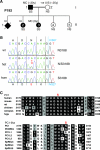Incompletely penetrant PKD1 alleles suggest a role for gene dosage in cyst initiation in polycystic kidney disease
- PMID: 19165178
- PMCID: PMC2813773
- DOI: 10.1038/ki.2008.686
Incompletely penetrant PKD1 alleles suggest a role for gene dosage in cyst initiation in polycystic kidney disease
Erratum in
- Kidney Int. 2009 Jun;75(12):1359
- Kidney Int. 2010 Feb;77(4):368. Niaudet, W Patrick [corrected to Niaudet, Patrick]
-
Correction to "Incompletely penetrant PKD1 alleles suggest a role for gene dosage in cyst initiation in polycystic kidney disease".Kidney Int. 2009 Jun 2;75(12):1359. doi: 10.1038/ki.2009.151. Epub 2015 Oct 20. Kidney Int. 2009. PMID: 30036924 No abstract available.
Abstract
Autosomal dominant polycystic kidney disease (ADPKD) caused by mutations in PKD1 is significantly more severe than PKD2. Typically, ADPKD presents in adulthood but is rarely diagnosed in utero with enlarged, echogenic kidneys. Somatic mutations are thought crucial for cyst development, but gene dosage is also important since animal models with hypomorphic alleles develop cysts, but are viable as homozygotes. We screened for mutations in PKD1 and PKD2 in two consanguineous families and found PKD1 missense variants predicted to be pathogenic. In one family, two siblings homozygous for R3277C developed end stage renal disease at ages 75 and 62 years, while six heterozygotes had few cysts. In the other family, the father and two children with moderate to severe disease were homozygous for N3188S. In both families homozygous disease was associated with small cysts of relatively uniform size while marked cyst heterogeneity is typical of ADPKD. In another family, one patient diagnosed in childhood was found to be a compound heterozygote for the PKD1 variants R3105W and R2765C. All three families had evidence of developmental defects of the collecting system. Three additional ADPKD families with in utero onset had a truncating mutation in trans with either R3277C or R2765C. These cases suggest the presence of incompletely penetrant PKD1 alleles. The alleles alone may result in mild cystic disease; two such alleles cause typical to severe disease; and, in combination with an inactivating allele, are associated with early onset disease. Our study indicates that the dosage of functional PKD1 protein may be critical for cyst initiation.
Figures




Comment in
-
The diversity of PKD1 alleles: implications for disease pathogenesis and genetic counseling.Kidney Int. 2009 Apr;75(8):765-7. doi: 10.1038/ki.2009.17. Kidney Int. 2009. PMID: 19337214 Review.
References
-
- European Polycystic Kidney Disease Consortium The polycystic kidney disease 1 gene encodes a 14 kb transcript and lies within a duplicated region on chromosome 16. Cell. 1994;77:881–894. - PubMed
-
- Mochizuki T, Wu G, Hayashi T, et al. PKD2, a gene for polycystic kidney disease that encodes an integral membrane protein. Science. 1996;272:1339–1342. - PubMed
-
- Rossetti S, Consugar MB, Chapman AB, et al. Comprehensive molecular diagnostics in autosomal dominant polycystic kidney disease. J Am Soc Nephrol. 2007;18:2143–2160. - PubMed
-
- Rossetti S, Harris PC. Genotype–phenotype correlations in autosomal dominant and autosomal recessive polycystic kidney disease. J Am Soc Nephrol. 2007;18:1374–1380. - PubMed
-
- Hateboer N, van Dijk MA, Bogdanova N, et al. Comparison of phenotypes of polycystic kidney disease types 1 and 2. Lancet. 1999;353:103–107. - PubMed
Publication types
MeSH terms
Substances
Grants and funding
LinkOut - more resources
Full Text Sources
Other Literature Sources
Miscellaneous

